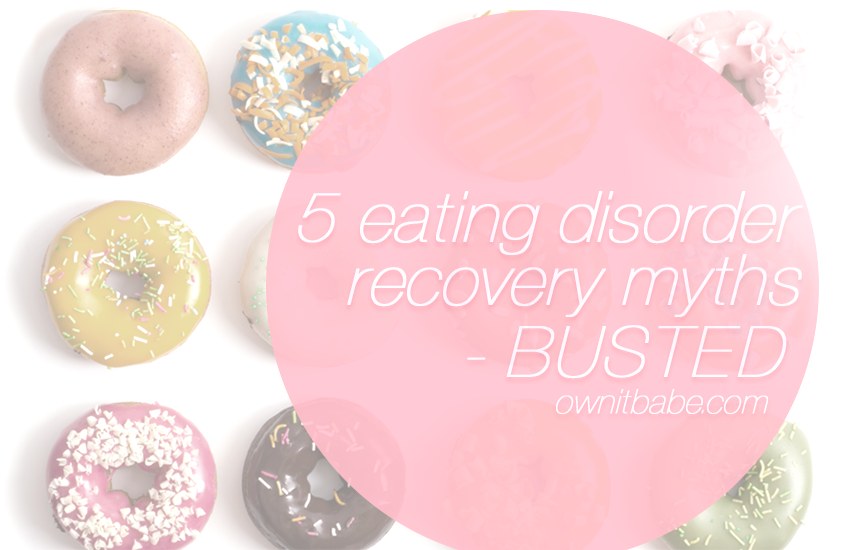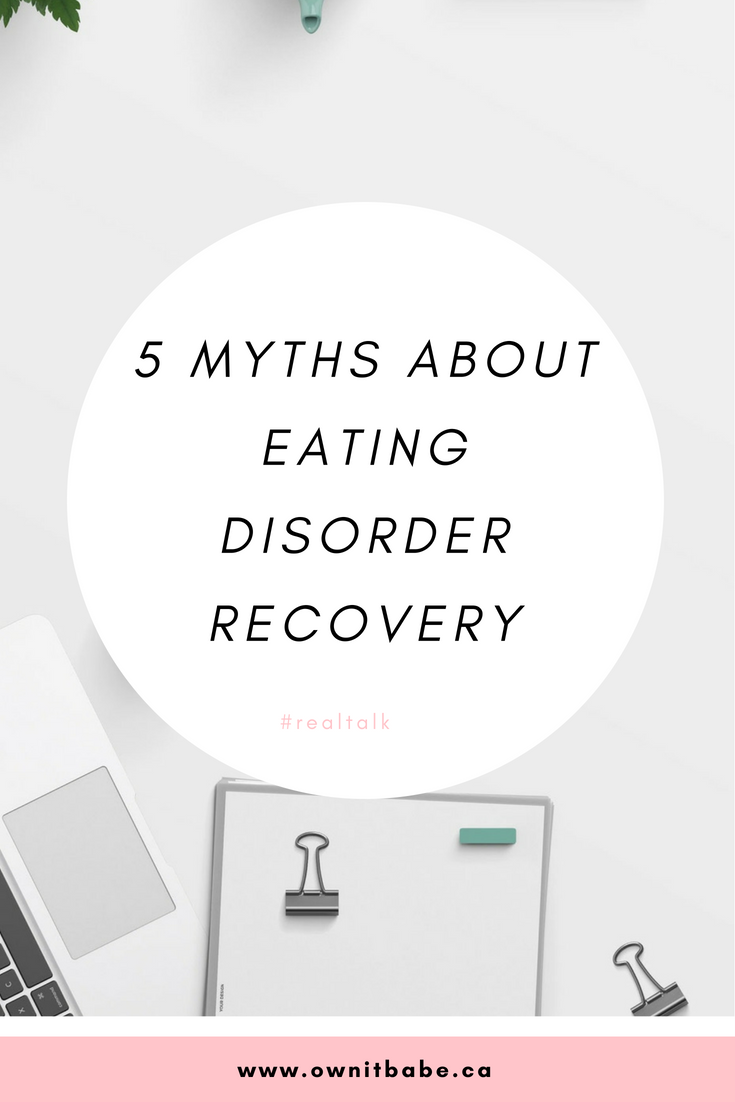
5 eating disorder recovery myths – BUSTED
[Disclaimer: The content of this article is for informational and educational purposes only and is not a substitute for medical advice, health care or eating disorder treatment.]
Recovering from an eating disorder or disordered eating is one of the hardest challenges I ever put myself through. The daily struggle, especially at the beginning, the shame about giving up a piece of your identity… There is so many challenges that come with recovery, but I absolutely believe that a full recovery is possible.
However, there is a lot of “common knowledge” myths about recovery. I believe that seeing the big picture and visualizing your life after recovery is so powerful, so I want you to avoid falling into those false beliefs about recovery. Here we go, five myths about recovery, BUSTED!

Myth number 1: Eating disorders come in certain shapes and sizes (small body=anorexia, large body=binge eating disorder) and need a different recovery protocol
I was once denied eating disorder treatment, because my body was considered “too large” for the treatment facility. I was absolutely crushed. However, it also made me more passionate about spreading the message that eating disorders come in ALL shapes and sizes. You can be in a large body and engage in anorexic behaviors or you can be in a small body and suffer from binge eating disorder. We have this image of an emaciated body attached to anorexia, but this is just a tiny percentage of the population that suffers. I believe that we all deserve the help that we need and the overall goal of recovery should be the exact same, no matter the symptoms.
Most of my clients in recovery, who are in a larger body, have been advised by their doctor to visit a “weight management” clinic. Some of them have suffered from binge eating disorder, some of them from bulimia and some of them from anorexia. Prescribing weight loss only puts more pressure on them to obsess over what they put in their bodies and is anything but helpful. My clients who are in a small body on the other hand, are advised to put on weight, no matter what their eating disorder symptoms are.
I don’t think it is helpful for anybody in recovery to pursue weight loss. It only perpetuates the cycle of restricting and binge eating. On the other hand, telling someone in recovery to put on weight is also not enough help at all.
The goal is to support this person in finding peace with food and their body. The goal is to get to a place, where you are not obsessing about food and where food doesn’t scare you. Eating should be an effortless habit that we engage in when we are hungry. Spending 14 hours a day thinking about food takes away from living our life.
Myth number 2: Once your weight is restored, you are recovered
I was talking to a friend of mine the other day who went through eating disorder treatment for anorexia. She described the horrible protocol she was put through and I was shocked. All they did for ten days is force feed her, so she would put on weight. As soon as her weight was “save enough” they discharged her from the clinic and prescribed an outpatient treatment.
Needless to say, she didn’t recover at all at this point. Recovery is about changing our mindset around food and our body. Most of the times, it has nothing to do with reaching a “normal weight” if that is even a thing. We need to change our thinking and our habits around food and our body in order to find peace with both. Weight restoration and re-feeding alone will not help anybody.
Myth number 3: Once you are recovered, your life will be amazing
This myth is a former belief of mine that I was guilty of. I thought that once I heal my relationship with food and my body, my life will be carefree. I basically spent half my life obsessing about food, calories and my body, so once that was out of the picture, I couldn’t imagine having any other problems dragging me down.
Boy, was I wrong! Once my obsessive thoughts subsided, they made room for the real stuff to come to the surface. Like, feeling unworthy of love and support sometimes. Or being homesick. Having an emotional day, because something happened at work. Getting into a fight with a loved one. Being on your period and watching your hormones go crazy. Mourning a loss from sometimes years ago that I suppressed with my obsession about food.
You know what though? These emotions are REAL, they have nothing to do with food. And feeling those uncomfortable feelings also makes room to feel pure joy, to be present in the moment and to laugh those deep belly laughs that I didn’t experience for so many years. Its a wonderful mess called life and I wouldn’t have it any other way. Nobody’s life is perfect (I am talking to you, Instagram!) and it’s time we embrace that.
Myth number 4: Intuitive eating in recovery leads to weight loss
Intuitive eating can be used as a diet, if you are still in diet-mentality. Your eating disorder brain can easily transform intuitive eating into a “hunger and fullness diet” as Isabel Foxen Duke likes to put it. If you use intuitive eating for weight loss purposes, you are missing the true beauty of it.
We starved our bodies, punished them, stuffed and abused them for years, so finding balance takes time. Initial weight gain is totally normal. Sometimes your ideal weight range will be higher than you wished for and learning to be okay with it is part of living a full life. I promise you that the weight gain will eventually stop, because your body will understand that there will always be new food coming in.
For this to happen, you need to give your body time to trust you again. I encourage you to always treat your body with kindness and respect, no matter what it decides to look like. It is doing the best it can to provide you with a full life on this earth. I am here to support you on your journey to intuitive eating, should this be your goal.
Myth number 5: There is NO such thing as a full recovery – you will always have disordered thoughts around food
This is one of the most devastating things to hear at the beginning of recovery. It takes the entire purpose out of the equation. Why are we being told that we will never recover and then expect to actually follow through with recovery? It is very counter intuitive and I personally do believe that a full recovery is possible. The reason, a lot of people hold onto this mentality, is because they replace one behavior with another.
Here is an example: I see a lot of people recovering that now follow a very strict diet, i.e. gluten free, Paleo, Keto, low-carb, etc. This may work for some people and give them a sense of freedom. But, for most of us it perpetuates the obsession. Maybe we don’t worry about restricting food anymore, but now we worry about avoiding certain foods. We worry about bringing our own meals everywhere, counting macros or thinking about food all day, AGAIN.
Do you see how this is the exact same pattern? In some cases, the financial situation people are in holds them back from seeking help and I completely understand that. However, there is a ton of free resources out there to at least support you in making changes.
Keep up the good fight my friend!



